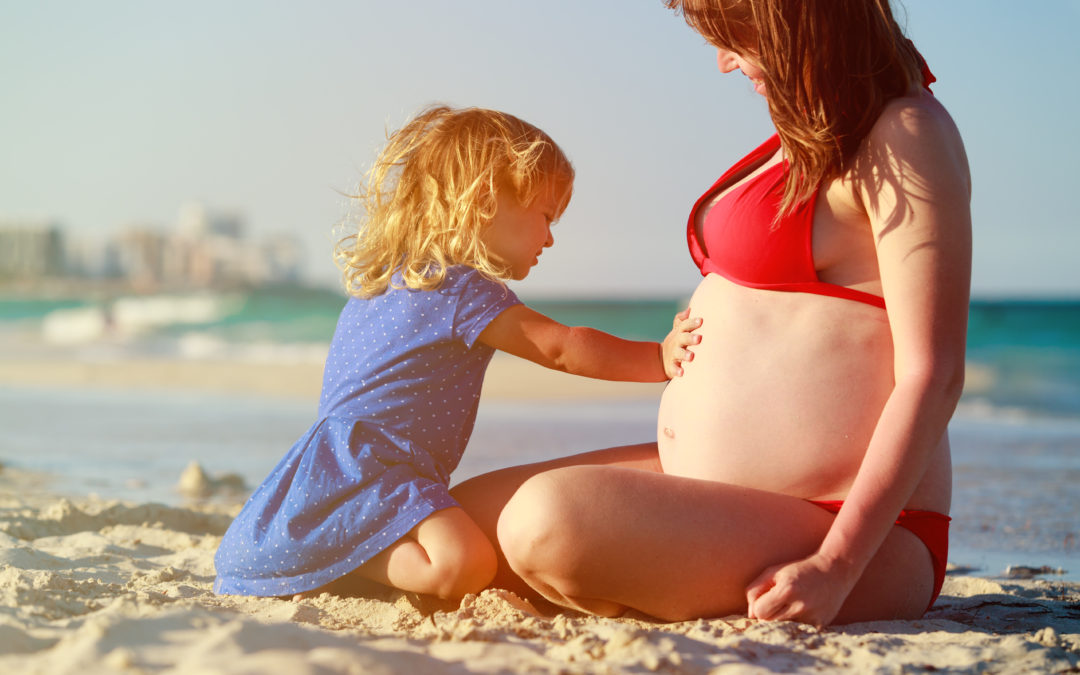It’s summertime and all we want to do is soak up some rays and have a good time! Before you walk out the door with a beach bag and swimsuit, double check a few things that can protect you and your baby while out in the sun.
What Sunscreen Should I Use?
While pregnant your skin is more sensitive due to your hormones and the changes your body is going through. Many women will experience anything (and sometimes everything) from stretch marks to dark pigmentation. Not to mention–like our parents told us all the time–if you don’t protect your skin you leave yourself open to developing skin cancer. To protect yourself from these concerns, we highly recommend using a broad spectrum, mineral-based sunscreen with an SPF of 30 or more. Why these specific details, you ask?
- According to the American Academy of Dermatology: “SPF of at least 30, blocks 97 percent of the sun’s UVB rays. Higher-number SPFs block slightly more of the sun’s UVB rays, but no sunscreen can block 100 percent of them. ”
- A broad spectrum sunscreen will guard you from both UVA and UVB rays, not just one or the other.
- Mineral-based, or physical sunscreen, is made with titanium dioxide or zinc oxide, which won’t absorb into the skin as much and are hypoallergenic!
- A water-proof sunscreen along with the other factors is a plus!
Additional Tips:
- Stay in or find shade during hot, peak sun hours, typically between 10am to 2pm.
- Cover you skin as much as possible with breathable fabric that has UV protection built-in or has a tight knit where sun barely passes through.
- Bring a wide-brimmed hat and sunglasses too! And don’t forget to stay hydrated!
Remember to apply 15 to 30 minutes before sun exposure, and to reapply every two hours or as directed by your doctor. Don’t just save the sunscreen for the hot, sunny days; even on cloudy days almost 80 percent of UV rays can harm your skin! A good rule of thumb is to always wear your sunscreen, no matter the weather or the season.
Can I Use Bug Spray too?
Yes, but choose carefully on which one. The Zika virus has been a hot topic lately and is definitely not something to laugh at, but certainly should not be panicked over. The experts say you are at a much higher risk of catching the virus by visiting locations where it is prevalent than catching it while on a hike or at the beach. Here are some tips for choosing the right bug protection:
- Most chemicals are safe for pregnant women when used in moderation and as directed by the instructions.
- Using up to 30% concentrated repellent DEET, up to 20% of picaridin, or 20% of the biopesticide IR3535 are safe for nursing or pregnant women to use according to the Center for Disease Control and Prevention (CDC). Clothing with the insect-repellent permethrin are also safe to use.
- Be sure to check that it’s Environmental Protection Agency (EPA) approved. The EPA reviews registered products and will approve of the “efficacy and human safety” levels based on the product’s instructions for use.
- Don’t let the chemicals soak in your skin all day if you can help it. Remember to rinse off once you’re back indoors for good each day.
- Do not use sunscreen that has built-in insect repellent, even if it meets the criteria from earlier. The repellent lowers and dilutes the effectiveness of the sunscreen if it’s in the same product. Use the repellent separately with sunscreen when needed.
For the full list of EPA approved products, use their search tool on their database to find one that is right for you and approved by your doctor.
Is Chlorine Safe for my Baby and Me?
Like in all good things, moderation is key. A 2002 study brought to light concerns on higher rates of water and airborne illnesses from densely populated, hot and highly chlorine-filled pools. Nothing conclusive was or has been found on if this affects pregnant women; and more so, swimming is actually good for pregnant women to practice with its numerous health benefits. Just exercise caution, and remember these tips:
- Go to pools that properly maintain their chlorine levels and if in doubt, ask!
- If the pool is packed and the weather is hot, it’d be best to stay by the poolside or try another day.
- Don’t stay at the pool all day; breathing in the fumes and soaking in chemically-treated water is not good for anyone–especially while pregnant. Take breaks and limit your time in the water as best as you can!
- Avoid hot tubs during your pregnancy. The consistant heat from this kind of pool raises your body temperature to unsafe levels that could severely impact your baby’s brain development or even lead to a miscarriage.
- Don’t try to swim or spend long periods in non-chlorinated water; high levels of chlorine is not good, but no chlorine at all to help kill bacteria is more unsafe for you and your baby’s health.
- Consult your doctor on safe practices for pool time and swimming exercises, especially if you’re feeling unsure!
Today’s blog was filled with many cautionary tips and statistics and while they shouldn’t be taken lightly, they also are not meant to make you panic or scared. You should go out and enjoy the summer sun and pool! We’ll reference to the phrase: “Don’t let the fear of striking out keep you from playing the game.” Just because you’re pregnant doesn’t mean you’re on lockdown mode. Go out and enjoy your summer as safely and happily as you can.
For questions or concerns, or even setting up an appointment, feel free to contact us at any of our three locations.
